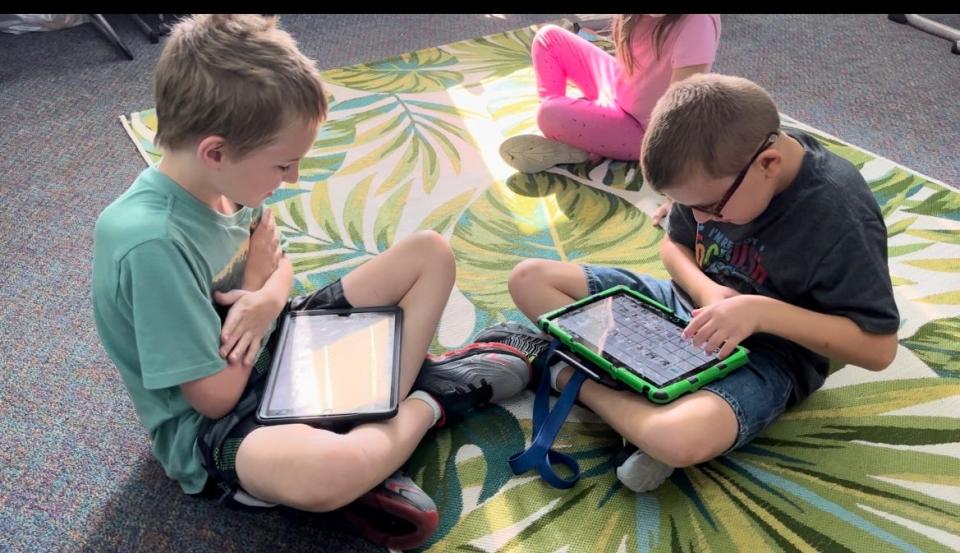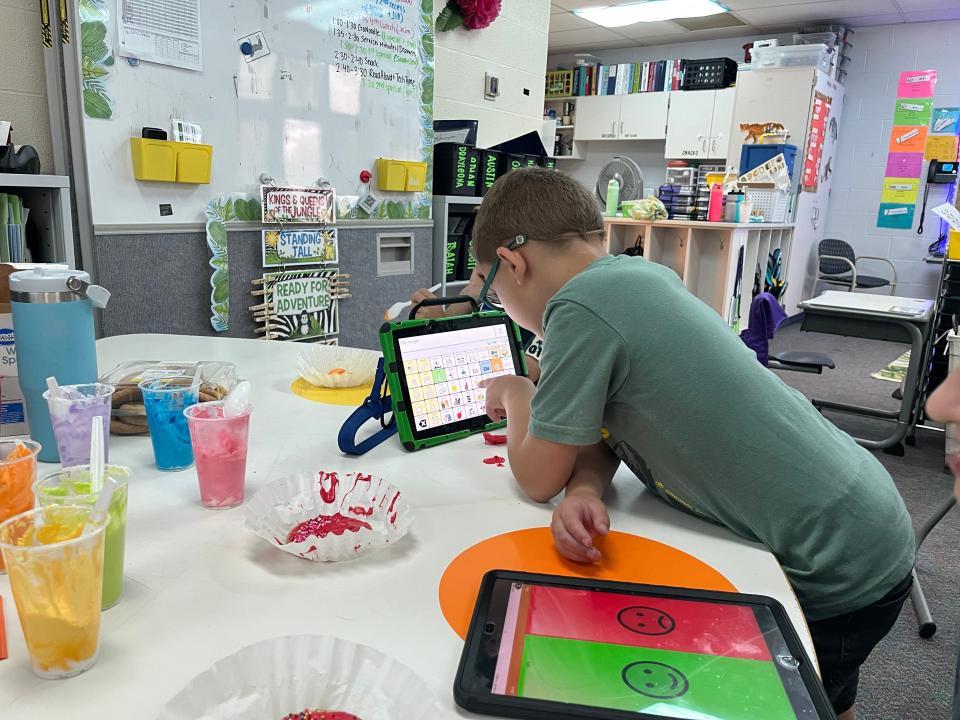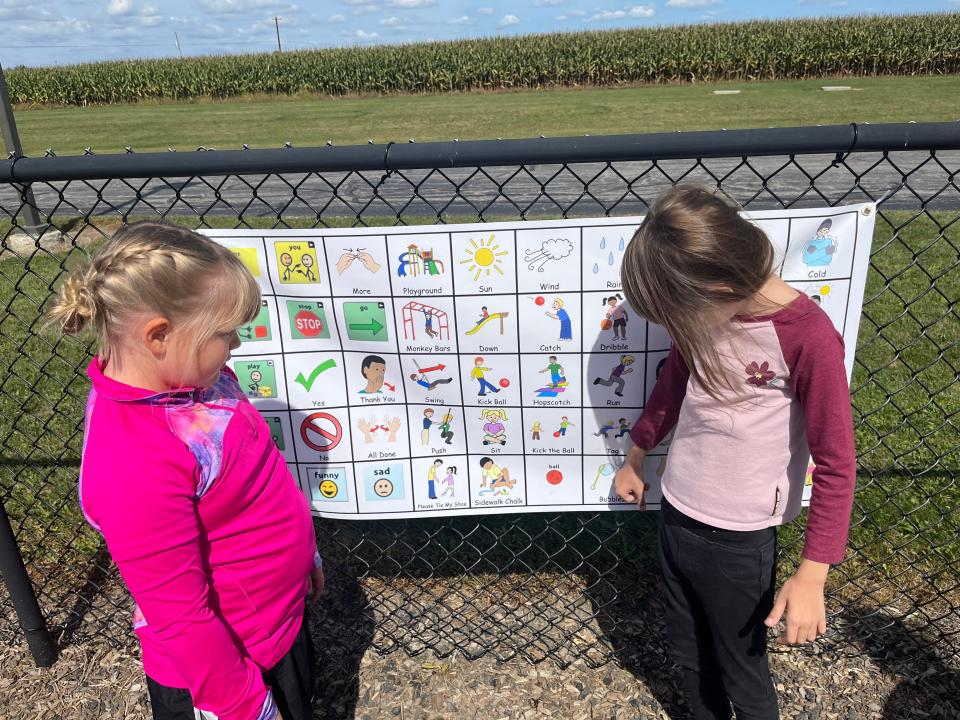Marion Community Foundation's TEACH grants support back-to-school initiatives
“Just because someone is nonverbal does not mean they have nothing to say,” said Emily Leader, intervention specialist at River Valley’s Heritage Elementary School and mother of a nonverbal child.
This simple concept was the impetus for Leader, teacher Cassy Lutz and speech language pathologist Alexis Phipps to team up and apply for a 2023 Teaching, Educating And Classroom Help (TEACH) grant from Marion Community Foundation. Leader and Lutz have six nonverbal students in their classroom and their grant application seeks to support those students’ ability to express themselves and communicate with their teachers and friends.
With their TEACH grant, the Heritage team added six new TouchChat devices at the school. The app is installed on classroom iPads and adapted for visual communication core boards on the school’s playgrounds. Both devices help children develop language and give those uncomfortable with speaking an alternative way to communicate in the classroom and with their peers.
TouchChat includes a voice synthesizer capable of multiple languages and is designed for individuals who have difficulty using their natural voice, such as those with Autism, Down Syndrome, ALS, apraxia, stroke, and related conditions.

Marion Community Foundation’s TEACH grant enabled the school to go from two shared devices to one for each student in the specialized skills classroom.
“This is a huge step forward for us,” said Leader. “Prior to this, we had two devices, which were shared by our six students, but sharing a communications device is like sharing an arm. Each student having their own means they can finally sit and talk to a friend like other students. It’s just so heartwarming.”

How TouchChat software works
The TouchChat software displays words and pictures to represent those words, which students can touch to have the words pronounced so they can communicate their thoughts with others. The teachers have also designed two core boards for the school’s playground which manually mimic the TouchChat home screen, allowing the students significantly easier communication with friends and peers.
The playground core boards include words like "play" and "ball" and "help" so students can socialize while on the playground, where taking technology like the iPads would be problematic.

Hope that classroom experience with TouchChat can be used at home
Leader and Lutz are not stopping there. Their hope is that their classroom initiative will be inspiring to parents, who will then want to bring the experience into their homes.
“We can help parents with paperwork and insurance issues to get their students their own personal devices, then the students can always have access, at school and with family at home,” said Lutz.
“Research in this area demonstrates that the use of adaptive communications devices early is key to language development. The earlier these devices are introduced, the better," she emphasized.
More TEACH grants awarded
In addition to the TouchChat project at River Valley, Marion Community Foundation has awarded the following TEACH grants in Marion and Morrow Counties:
What is a Phoneme? — Laura Rengert teaches striving readers in first through third grades at River Valley Heritage Elementary who lack phonemic awareness skills. Her TEACH grant will add hands-on materials to her classroom to help students become more active in their learning, teach them to hear sounds in words, manipulate phonemes (sounds), blend and segment words, rhyme, and divide longer words – skills which improve reading speed and comprehension.
Breakout EDU — Lori Bertrand will use BreakoutEDU to bring an escape room-inspired learning program to Marion City Schools’ students at Harding High School. Her TEACH grant will enable Harding to add this popular puzzle-style program to encourage students’ critical thinking and content skills in many subject areas and will be available to Harding’s teachers, media specialists and content coaches.
IEP Bin Program — Jodi Grafmiller, an intervention specialist at Marion City Schools/Hayes Elementary, received a TEACH grant for an Individualized Education Plan (IEP) bin program for underprivileged students with disabilities, such as autism, brain injuries and physical limitations. An IEP bin is a specialized bin for each student equipped with necessities needed to meet that individual’s educational goals and various learning styles.
Building a Thinking Classroom — Kim Robinson, a 20-year veteran math teacher, has created a Thinking Classroom for her students, a teaching style which incorporates small group, collaborative learning while standing at vertical whiteboards. Robinson’s TEACH grant will provide durable magnetic whiteboards, markers and cleaner to enhance student work in her classroom at River Valley Middle School.
Chickquest — Julie McClure’s first graders at River Valley’s Heritage Elementary hatch chickens in their classrooms each spring using the Ohio Soybean Council’s Chickquest program to foster an appreciation for agriculture. Her TEACH grant will cover the cost of eggs, shavings, feed and other supplies to continue this much beloved student project.
Science Go Direct–Vernier STEM lab equipment — The grades three, four and five at River Valley Heritage Elementary will have their learning enhanced by a Vernier Science Go Direct package, thanks to a TEACH Grant received by teacher Michelle Estep. The Vernier equipment will enable students to detect and measure differences in various forms of energy during science classes.
Every Kid Can Play an Instrument — River Valley Music Teacher Brea Turner is receiving a grant to purchase 45 ukuleles, an instrument she says “every kid can play.” The instruments will be used by kindergarten through fifth grade students of both Heritage and Liberty elementary schools, provide them with music instruction, and create an after-school ukulele club.
Around the World in 30 books — Amanda Burke’s third grade students at River Valley’s Heritage Elementary will “travel” around the world via 30 new books which explore cultures and countries. The students will learn mapping skills, vocabulary words, comprehension and gain a respect for the cultures that surround them.
CometCast — Elgin’s career connections teacher, Eric Robinson, was instrumental in helping students create and develop CometCast, a wildly popular student engagement class which has surged from a 10-student group to a full-sized class of 22 — with a waiting list — in just two years. CometCast is a broadcast produced, directed, edited and starring Elgin High School students. A 2023 TEACH grant will add better lighting, lenses and microphones this school year.
Book Club — In response to student requests, teachers Jessica Keplinger and Michael Kenney implemented a book club at Elgin High School. A TEACH grant will purchase books to expand the club’s collection and support the development of a digital loan system for this growing student group.
Ohio Communities: An Informational Text Adventure in Learning — Pleasant Elementary Teacher Alicia Davis received a TEACH grant to expand quality non-fiction reading resources for her students. The grant will purchase 100 print and digital student subscriptions to Ohio Communities & Science Studies Weekly, a reading resource for social studies and science.
Power of Place: Marion City/County Parks Project — A River Valley High School team of teachers — Pam Holman, Sue Itterly and Kecia Slob — developed the “Power of Place” program to encourage hometown pride in their 300 high school science students. The concept connects juniors and seniors to their local environment — the main goal of which is to increase student involvement in their local parks and make students more aware of the resources they have locally. The program is being coordinated with the Marion City and County Parks departments, as well as naturalist James Anderson.
All Things Algebra Geometry Bundle — Math teacher Taylor Tackett will add the All Things Algebra Geometry Bundle, a curriculum created by Gina Wilson, to Northmor High School‘s geometry classes thanks to TEACH grant. The program includes organized notes, quizzes and challenging problems for geometry students, as well as a variety of engaging hands-on activities which promote interest and comfort in learning challenging concepts in geometry.
Kindle Reading Achievement — Cardington-Lincoln’s Ginger Holloway, a 22-year veteran language arts and reading teacher, is using a TEACH grant to purchase four Kindle devices to expand her students’ access to a wide range of texts which address several prevalent issues she sees in her eighth grade classroom — students struggling to decode text and comprehend reading passages, as well as reading fluency. The technology allows students to practice reading strategies with guided instruction and independent work, while addressing the goal of autonomous reading for the large number of students who need assistance.
The TEACH Grants program, now in its fourth year, supports local education and is made possible by the following endowment funds at Marion Community Foundation: Pillar Credit Union Teachers’ Fund, Pillar Credit Union Morrow County Teachers’ Fund, River Valley Teachers Fund, Ray & Charlotte Baldauf Fund and numerous individual donors.
The 2024 TEACH Grants Program application period opens in February. Additional support is always encouraged, and donations may be made to any of the funds listed above. An online giving option is available at MarionCommunityFoundation.org.
Marion Community Foundation is celebrating 25 years of service to the Marion area. Its offices are located at 504 S. State St.
This article originally appeared on Marion Star: Marion Community Foundation awards TEACH grants to local educators

